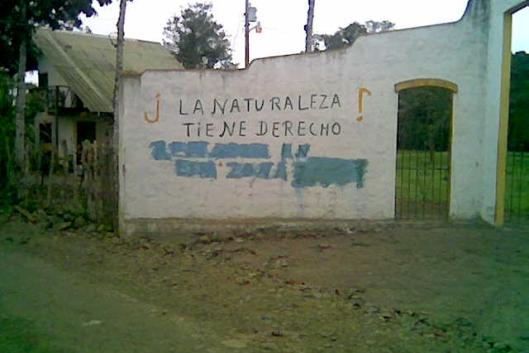As expected, the climate conference in Durban has not taken any significant decision in terms of combating the climate crisis. Maybe in 2020 a new binding agreement will be signed. 2020? According to the network of organizations and movements called Climate Justice Now, this constitutes a “crime against humanity”. It seems as if those governments who are the most responsible for the climate crisis have given up any consideration for the people who have become victims of the crisis, those who are affected or seriously threatened by climate change, especially poor women.
But we know and have seen how those governments do have a lot of consideration for their own interests, their wealth, for their transnational companies and financial institutions. They continue denying their historical responsibility for climate change, and continue polluting, even more than before, but point their fingers at countries like China, India and Brazil, recently more significant polluters. The peoples, both in the North as well as in the South, and even many mainly Southern governments, are just observers of the conferences. They are not consulted, while the consequences will be huge for the big majority of the world population that lives in the global South and that has an insignificant responsibility for the climate crisis.
The next international meeting point for governments to discuss climate and the environment will be the Rio+20 Conference in June 2012, 20 years after the 1992 conference in the same city. In 1992, the environmental crisis was given a more central place in the international debate. After 20 years, the climate issue, and in broader terms, the environmental issue, has definitely lost priority for Northern governments. It seems to be only of interest to them if it can benefit their companies, their banks, their economic growth, including offsetting their pollution through REDD+ projects, falsely supposed to conserve forests. Not surprisingly, Rio+20 actually puts the word “economy” – not environment, climate, nature or people – at the center of the debate. And to make it sound good, and not like “business as usual”, they call it not just “economy” but “green economy”.
In December in Durban, you could hear the following kind of observation among civil society groups and social movements, commenting on the official conference: it is time that we build and decide on our own agenda, instead of following the agenda of the governments and their conferences, which do not lead to solutions, only to more frustrations, besides corporate profits. Maybe this idea of an “own agenda” could be a way of dealing with and even influencing in a more fruitful way the conferences and the governments.
One way of building this kind of people's agenda by organizations and movements could be, instead of spending time, money and energy in going to and attending the conferences, a decision to invest time, money and energy in meeting at the local and regional level with communities to discuss and analyze what is happening at these conferences and contribute to discussing actions at the local, regional, national and even international level in order to put pressure on the governments. Maybe such a coordinated effort in many countries all over the world, in the North and in the South, before, during and after the conferences, could make governments more willing to consider listening to the people and their demands.
And more concretely for Rio+20 and for the participating organizations, instead of going to the conferences and organizing their often interesting but mostly fragmented and separated agenda of activities, let's work more together towards a joint agenda, which should include concrete support for the struggles of people in and around Rio de Janeiro against destructive projects, in order to put pressure on our governments for real solutions for the climate and related crises. Maybe such a proposal could involve many more people in our mobilizations, as well as being much more effective in terms of influencing our governments. And let's continue this spirit of cooperation beyond Rio+20, building a stronger movement.
This proposal is being spread by the call to Mobilize Together Towards Rio+20 and Beyond, launched last month by organizations, networks and social movements involved in the building of the Peoples' Summit for social and environmental justice, against the commodification of life and nature in defense of the commons, to be held in Rio de Janeiro, Brazil, June 18-23, 2012, parallel to the Rio+20 conference (seewww.wrm.org.uy/RIO+20/Mobilize_together.html for the complete text of this call).
We need to be creative, to find ways of more effectively challenging unequal power relations, including unequal gender relations, in the world. Social movements teach us that to change unequal power relations, movement building, with women and men, is an essential tool. And it is possible to build a strong and powerful movement, especially if we realize that women and men all over the world are affected, although in different ways, by the profit-driven practices of corporations and other actors including states, backed by financial institutions and governments. With a stronger and more common voice, it will become less and less easy for our governments not to consider or not to listen to the people.
